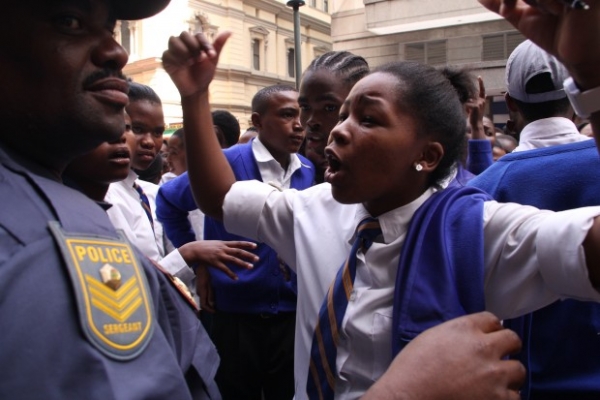I live in Cape Town, South Africa. Far away from the community organizing, battle-waging on the streets of Ferguson, Missouri, I read through the effects of police brutality from my news sources in my own backyard and I am overcome with a sense of connectedness with these problems.
In my short life, I have met precious few African-Americans, but when I have, I’ve been struck by the immediate feeling at the pit of my stomach that assures me that I’m speaking with family. It distresses me though, that too often, we put aside this notion of our connectedness to discuss our problems in a language of narrow nationalism. With all our context-specific differences and nuances, there are levels where we are the same.
Violence against black bodies. Police Brutality.The criminalization of the poor. The prison-industrial complex. All insidious incarnations of structural violence that know no national
Neither white supremacy nor patriarchy care for your national boundaries.
So surely, too, must our love, shared together, not know the confines of borders that divide common experiences. On Friday the 6 of March, students from Philippi High School, a heavily under-resourced school located in an area of Cape Town called Philippi, protested – unarmed – against their lack of school infrastructure and were met with violence. Two stun grenades were deployed, searing through school uniforms and inciting panic. These children were treated like criminals. Many South Africans now read these scenes as headlines with the echoes of the sounds of gunshots that remind us of dark parts of our history.
These children were treated like criminals.
Our children. Criminals. Now, amid the anguish and sheer disgust that inevitably comes over our bodies upon the news of injustice, it is incumbent upon us to center our minds in the truth that there are common threads of violence that cast shadows onto empty parking lots, playgrounds and classrooms all over the world.
From Ferguson to Philippi, the pain is the same.
Two stun grenades were deployed, searing through school uniforms and inciting panic. These children were treated like criminals.
I wonder if, perhaps, these times of increased connectedness through social media demand that we re-invoke the necessity of transnational movements reminiscent of those that existed in the days when our families were separated and labelled as slaves. After all this time, in this world, do we not exist as new slaves?
Child of Missouri.
Child of Soweto.
Child of São Paulo.
Can we ready ourselves to fulfill our responsibility to continue the intergenerational quest for freedom? To build strategically. We surely need to speak over national language, which clouds judgement and fools us to believe that our problems are exceptional.
Our silence. Our absence. In conversations about the oppressions of our global family, to me, show the state of our relationship. There are far too many voices left out of conversations that carry these shared experiences. It is a great tragedy that we have grown to become distant from one another, but now more than ever before, there is hope for us to shape the direction of our relationship, effective immediately.
For those who are yearning to be connected. To be recognised. To have their basic needs met. It is our duty today, as it was yesterday, to carve out roads and pathways with our hands. Roads from the Fergusons and Philippis.
We have infrastructure and opportunities at this moment that make today a good a time as any to help champion the next wave. In our own ways. Connected in our struggles and our triumphs. From Ferguson to Philippi.
